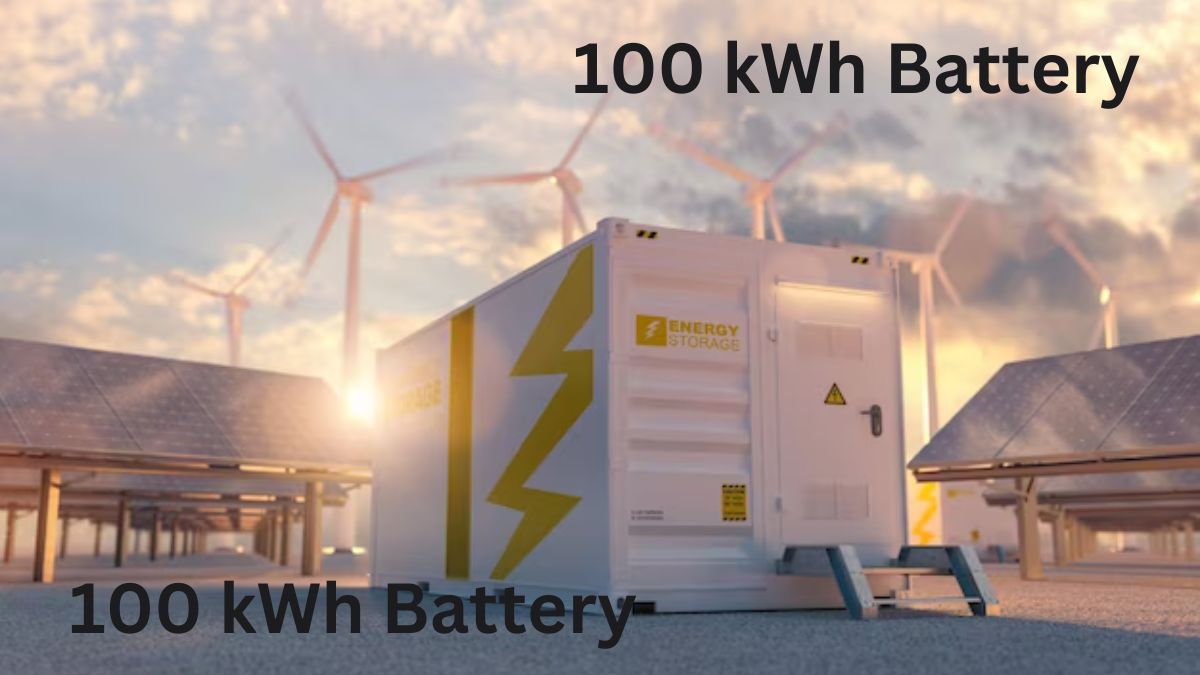TECH
Unleashing the Power of the 100 kWh Battery: Revolutionizing Energy Storage

Discovering reliable and for a long time sources of electricity is of greater significance than ever in today’s moment of fast technological advancement. The establishment of the 100 kWh battery is a particularly important achievement in the arena of energy storage. The large capacity of this battery is going to change a lot of things, from electric automobiles to renewable energy systems. The 100 kWh battery is the primary subject of this article as we examine its history, current state of growth and development, and potential future applications.
Understanding the 100 kWh Battery
First of all, let’s define a 100 kWh battery so that they’re on the same path when we get deep into the nitty-gritty. The battery has a substantial amount of energy storage capacity, hence it is labeled as “100 kWh” in response to that characteristic. This could have been compared to the monthly average of 877 kWh used by the typical American residence. Consequently, a 100 kWh battery can keep a residence functioning for almost ten days without being replenished.
Applications in Electric Vehicles
The battery’s one hundred kilowatt-hour (kWh) battery is seeing widespread utilization in electrically powered cars (EVs). As battery capacities rise, it becomes progressively viable for electric motor vehicles to replace traditional models propelled by combustion engines.
- The range of electric vehicles is significantly boosted by the 100 kWh battery. It allows Batteries to go further on a single charge, eliminating certain portions of the stress that comes with that restriction.
- Furthermore, a bigger battery allows batteries in electric cars to compete with their powered by gasoline alternatives in quickness and maximum velocity. High-performance automobile buyers and fans will appreciate the improved performance.
- Using 100 kWh batteries in EVs has positive effects on the environment by lowering carbon emissions and making a cleaner atmosphere. Greener electricity grids have a positive effect on the environmental friendliness of EVs fueled by such batteries.
Applications in Renewable Energy Storage
The pursuit of sustainable growth relies significantly on renewable energy sources including sunlight and wind power. However, they are intermittent, thus methods of storing energy must be developed in order to fully utilize them. In this case, the 100 kWh battery is crucial.
- Capacitors keep the power grid stable through permitting surplus energy to be collected during peak production periods and then unleashed during times of lower demand. This plays a role in the stabilization of the power grid, making providing a more predictable and secure supply of energy.
- Emergency Power: 100 kWh batteries can offer emergency power to households and businesses in areas prone to power outages, improving resilience and lowering dependency on fossil fuels for backup generators.
- Off-grid life is made possible by the combination of these batteries with renewable energy sources, eliminating the requirement for a connection to the regular power grid.
Challenges and Future Developments
There are many advantages to the 100 kWh battery, but it also has certain drawbacks.
- The high price of production might render high-capacity batteries out of reach for many people. But the goal of the continuous R&D is to lower production costs.
- The size and heft of these batteries can restrict their usefulness in some settings. The constant development of battery technology is working to solve these problems.
- There is an environmental impact from both battery manufacturing and disposal. Measures like recycling and eco-friendly production methods are being considered to lessen the impact.
Many exciting things are in the horizon with 100 kWh batteries:
- More energy can be stored in a smaller and lighter container thanks to continuous efforts to boost the energy density of batteries.
- To lessen their impact on the environment, manufacturers are looking towards developing batteries made from sustainable materials and recycling technologies.
- Compatibility with smart grids: these batteries will be indispensable in smart grids, facilitating efficient and effective administration of energy resources.
Conclusion
The revolutionary 100 kWh battery has the potential to completely alter the way energy is generated, transported, and stored. It has numerous potential uses, including as charging electric vehicles and storing renewable energy. We can look forward to a future when these high-capacity batteries are an essential component of our sustainable energy ecosystem after we solve the problems of cost, size, and environmental effect. As a bonus to helping the environment, adopting such advancements also
FAQs (Frequently Asked Questions)
- What exactly is a 100 kWh battery?
- Rechargeables with a capacity of 100 kilowatt-hours (kWh) are referred to as high-capacity storage devices for electricity. It finds consumption in things that are as varied as electric cars and banks of batteries for energy produced from renewable sources.
- Why are 100 kWh batteries important?
- These types of batteries are essential because of the enormous amount of energy they hold. Uses where this is useful include electric cars, where it enhances range, and energy from renewable sources systems, where it reduces the impact of oscillations in energy production.
- How long does it take to charge a 100 kWh battery?
- A 100 kWh battery’s charging time is proportional to its current state of charge and the charger’s power output. An electric car with a 100 kWh battery might reach 80% charge using a fast charger in 30 minutes to an hour. However, a full charge on a regular charger might take a while.
- What is the lifespan of a 100 kWh battery?
- A 100 kWh battery’s lifespan can be influenced by a number of characteristics, including but not limited to the manner in which it is used and the surrounding environment. The battery in electric cars traditionally comes with a manufacturer’s warranty of 8–10 years or 100,000–150,000 kilometers. The battery’s capacity may decrease beyond this time, but it will still have some usage.
- Are 100 kWh batteries safe?
- The 100 kWh batteries are safe because they are built that way. Overheating, short circuits, and other risks can be avoided thanks to features like thermal management systems and various levels of protection. Their risk-free functioning is ensured by adhering to the instructions for their upkeep and use.
TECH
Unveiling the Magic of Crossovericon.eu: A Comprehensive Guide
Welcome to a world where creativity meets technology, and innovation knows no bounds. Crossovericon.eu is your gateway to a realm where design possibilities are endless, and visual storytelling takes center stage. Get ready to embark on an exciting journey as we unveil the magic of Crossovericon.eu – a comprehensive guide that will revolutionize the way you approach graphic design. Join us as we delve into the history, features, tips, success stories, and future of this game-changing platform. The time has come to unlock your creative potential like never before!
The History of Crossovericon.eu
Step back in time to unravel the captivating history of Crossovericon.eu. Founded by a team of innovative minds with a vision for bridging connections, this platform emerged as a game-changer in the industry. From its humble beginnings to becoming a powerhouse resource, Crossovericon.eu has evolved into an essential tool for professionals and enthusiasts alike.
The journey of Crossovericon.eu is marked by relentless dedication and continuous improvement. It was born out of the need for a versatile solution that could seamlessly integrate diverse elements, catering to the ever-changing demands of users across various fields. With each milestone achieved and every challenge overcome, Crossovericon.eu solidified its position as a leading platform at the forefront of innovation.
As technology advanced and trends shifted, Crossovericon.eu adapted and expanded its offerings to stay ahead of the curve. Through strategic partnerships and user-centric design enhancements, it has remained resilient in an ever-evolving digital landscape. The rich tapestry of experiences woven into the history of Crossovericon.eu continues to inspire new generations seeking excellence and efficiency in their endeavors.
Exploring the Features of Crossovericon.eu
When it comes to exploring the features of Crossovericon.eu, users are in for a treat. This innovative platform offers a wide array of tools and functionalities designed to enhance productivity and creativity. From customizable icons to sleek interface designs, Crossovericon.eu has something for everyone.
One standout feature is the drag-and-drop editor, which allows users to effortlessly create stunning icons with just a few clicks. Additionally, the extensive library of pre-designed templates provides endless inspiration for your projects. Whether you’re a seasoned designer or new to the world of icon creation, Crossovericon.eu caters to all skill levels.
Another noteworthy aspect is the seamless integration with popular design software like Adobe Illustrator and Sketch. This compatibility ensures smooth workflow transitions and enables users to easily incorporate their custom icons into existing projects. With intuitive features and user-friendly navigation, exploring Crossovericon.eu is both enjoyable and rewarding for designers looking to elevate their work.
How to Use Crossovericon.eu for Maximum Benefit
Are you ready to unlock the full potential of Crossovericon.eu and take your projects to the next level? Let’s dive into how you can make the most out of this powerful tool.
First, familiarize yourself with the intuitive interface. Spend some time exploring the various features and functionalities available to you. From creating stunning visual assets to optimizing your workflow, there’s a lot you can do with Crossovericon.eu.
Next, leverage the customization options to tailor your designs to suit your unique style and branding. Experiment with different colors, fonts, and layouts until you achieve the perfect look for your project.
Don’t forget to collaborate with team members by easily sharing access and feedback within Crossovericon.eu. Streamline communication and streamline workflows for maximum efficiency.
Stay updated on new features and updates rolled out by Crossovericon.eu. Embrace continuous learning and innovation as you harness this tool for maximum benefit in all your creative endeavors.
Success Stories from Crossovericon.eu Users
Imagine logging onto Crossovericon.eu and being greeted by a plethora of success stories from users just like you. These stories are not only inspiring but also serve as motivation for your journey toward mastering the platform. Users share how they transformed their designs, elevated their branding, and captivated audiences with the help of Crossovericon.eu’s innovative features.
From graphic designers to small business owners, each success story is a testament to the power of creativity combined with cutting-edge technology. Users rave about the seamless user experience, extensive library of icons, and customizable options that allow them to bring their visions to life effortlessly.
As you read through these success stories, you can’t help but feel inspired to push your boundaries and explore new possibilities with Crossovericon.eu. The community of users cheering each other on creates a sense of camaraderie that propels everyone toward achieving their goals.
Tips and Tricks for Mastering Crossovericon.eu
Are you ready to take your design game to the next level with Crossovericon.eu? Here are some tips and tricks to help you master this powerful tool:
1. Customize Your Icons: Experiment with different styles, colors, and effects to create unique icons that truly represent your brand or project.
2. Utilize Templates: Don’t be afraid to start off with a template as a base and then customize it further to suit your needs. It can save you time and inspire.
3. Explore Advanced Features: Dive into the more advanced features of Crossovericon.eu, such as layering, blending modes, and icon sets. These tools can elevate your designs from good to great.
4. Collaborate with Others: Share your designs with colleagues or clients for feedback or collaboration opportunities. Two heads are better than one!
5. Stay Updated: With technology constantly evolving, make sure to stay updated on new features and updates released by Crossovericon.eu. This will ensure you’re always using the latest tools at your disposal.
Keep these tips in mind as you navigate through Crossovericon.eu’s interface and watch as your design skills soar!
The Future of Crossovericon.eu and Its Impact on the Industry
As we look towards the horizon, the future of Crossovericon.eu shines bright with possibilities. With its innovative approach to bridging different industries and cultures, this platform is poised to revolutionize how businesses collaborate and thrive in an ever-evolving global landscape.
By fostering connections between professionals from diverse backgrounds, Crossovericon.eu is breaking down barriers and creating a melting pot of creativity and innovation. This interconnectedness has the power to spark new ideas, drive growth, and propel industries forward into uncharted territories.
The impact of Crossovericon.eu on the industry cannot be underestimated. As more companies embrace this platform, we can expect to see a wave of cross-pollination that leads to breakthroughs in technology, design, marketing strategies, and beyond. The collaborative spirit fostered by Crossovericon.eu will undoubtedly shape the future of work as we know it.
In a world where collaboration is key to success, Crossovericon.eu stands at the forefront as a catalyst for change and progress. Its influence on the industry will continue to reverberate for years to come as it paves the way for a more connected and innovative future.
Conclusion
As we wrap up our exploration of Crossovericon.eu, this platform is a game-changer in the industry. With its innovative features, user-friendly interface, and a track record of success stories, Crossovericon.eu stands out as a must-try tool for anyone looking to enhance their online presence.
By harnessing the power of AI technology and design expertise, Crossovericon. eu offers unparalleled value to its users. Whether you’re a seasoned professional or just starting on your digital journey, this platform has something to offer everyone.
So why wait? Take the plunge and try Crossovericon.eu today. Unlock new possibilities for your projects and elevate your designs to new heights. Join the ranks of satisfied users who have experienced firsthand the magic that Crossovericon.eu has to offer.
Don’t miss out on this opportunity to revolutionize your creative process. Embrace innovation, unleash your creativity, and discover all that Crossovericon. eu has in store for you. The future of design is here – seize it with Crossovericon.eu!
TECH
Streamline Your Workflow with the Envato Grammarly Canva Package

Are you looking to revolutionize your workflow and boost productivity? Say hello to the ultimate power trio: Envato Grammarly Canva Package. This dynamic package is here to streamline your processes, elevate your content creation game, and help you achieve greater efficiency than ever before. Let’s dive into how this winning combination can transform the way you work!
How the Package Can Improve Your Workflow
Imagine having all the tools you need in one convenient package to streamline your workflow effortlessly. The Envato Grammarly Canva Package does just that by combining the power of Envato’s creative assets, Grammarly’s writing assistance, and Canva’s graphic design capabilities.
With this package at your fingertips, you can easily create visually stunning content while ensuring it is error-free and engaging. Say goodbye to switching between different platforms and juggling multiple subscriptions – everything you need is now centralized for maximum efficiency.
By using Envato’s vast library of templates, stock photos, fonts, and graphics combined with Grammarly’s grammar checking and Canvas design features, you’ll be able to produce professional-looking projects in a fraction of the time it would take using separate tools.
The seamless integration of these three powerhouse tools not only saves time but also enhances the quality of your work. Whether you’re a freelancer, marketer, or small business owner looking to boost productivity and output quality, this package is a game-changer for streamlining your workflow.
Features and Benefits of Each Tool
The Envato Grammarly Canva Package offers a range of features and benefits that can significantly enhance your workflow.
With Envato, you gain access to a vast library of high-quality digital assets such as templates, graphics, and themes for various projects. This allows you to save time and effort in creating visually appealing content.
Grammarly is a powerful tool that helps improve your writing by providing real-time suggestions for grammar, spelling, punctuation, and style enhancements. It ensures that your communication is clear, concise, and error-free.
Canva simplifies the design process with its user-friendly interface and extensive collection of customizable templates. Whether you need social media graphics or presentations, Canva has got you covered.
By combining these three tools in one package, you have everything you need to streamline your workflow efficiently while producing professional-looking content effortlessly.
Real-Life Examples of Successful Use
Imagine a graphic designer, Sarah, who used the Envato Grammarly Canva Package to streamline her workflow. With Grammarly, she effortlessly proofreads her content for errors and enhances its clarity. This saved her hours of manual editing and improved the quality of her work.
Canva’s user-friendly interface allowed Sarah to create stunning visuals quickly and efficiently. By utilizing templates and design elements from Envato Elements, she was able to produce professional-looking graphics in no time.
Sarah’s social media posts gained more engagement thanks to the cohesive look achieved with Canva designs. The seamless integration between these tools simplified her creative process, leading to increased productivity and client satisfaction.
These real-life examples show how combining the Envato Grammarly Canva Package can significantly enhance your workflow and elevate your results.
User Reviews and Testimonials
User reviews and testimonials play a crucial role in showcasing the real impact of the Envato Grammarly Canva Package. Hearing from actual users who have experienced the benefits firsthand provides valuable insights for those considering investing in this powerful trio of tools.
Many users rave about how seamlessly these three tools integrate with each other, streamlining their workflow and saving them time on tedious tasks. The convenience of having access to design templates, grammar checking, and content creation all in one package is a game-changer for many professionals.
Users also appreciate the user-friendly interfaces of Canva and Grammarly, making it easy for beginners to dive right in without feeling overwhelmed. The intuitive nature of these platforms allows users to focus on their work rather than getting bogged down by technicalities.
User reviews highlight the effectiveness and efficiency of the Envato Grammarly Canva Package in enhancing productivity and elevating the quality of work produced.
Comparison with Other Similar Packages
When it comes to streamlining your workflow, the Envato Grammarly Canva Package stands out from other similar packages in the market. While some tools may focus solely on grammar checking or design templates, this package offers a comprehensive solution that covers content creation and enhancement.
Unlike standalone platforms, this package combines the power of Envato’s creative assets with Grammarly’s advanced writing suggestions and Canva’s intuitive design features. This unique integration allows users to create high-quality content seamlessly without having to switch between multiple applications.
With its user-friendly interface and seamless integration capabilities, the Envato Grammarly Canva Package provides a one-stop solution for professionals looking to enhance their productivity and creativity. By offering a diverse range of tools within one cohesive package, users can save time and effort while producing professional-grade content efficiently.
When comparing the Envato Grammarly Canva Package to other similar packages available in the market, it is evident that this all-in-one solution offers unparalleled value and convenience for individuals seeking to streamline their workflow effectively.
Tips for Maximizing the Package’s Potential
To maximize the potential of the Envato Grammarly Canva Package, start by familiarizing yourself with each tool’s features. Take advantage of Grammarly’s grammar and spell-check capabilities to ensure your content is error-free. Use Canva’s intuitive design platform to create visually appealing graphics for your projects.
Utilize the integration between Grammarly and Canva within the package to seamlessly proofread and enhance your visual content. Save time by streamlining your workflow through these tools’ collaborative functions, allowing you to work efficiently on multiple projects simultaneously.
Experiment with different templates and styles offered by Canva to add a creative touch to your designs. Customize Grammarly settings to suit your writing style and preferences, enhancing the accuracy of its suggestions.
Stay updated on any new updates or features introduced in the package to improve your productivity and output quality continually. Engage with online tutorials or forums dedicated to users of these tools for additional tips and tricks on maximizing their potential.
Conclusion
By investing in the Envato Grammarly Canva Package, you are not just purchasing a set of tools; you are equipping yourself with a powerhouse of resources to streamline your workflow. The combination of Envato’s creative assets, Grammarly’s writing support, and Canva’s design capabilities offers a comprehensive solution for professionals seeking efficiency and excellence in their work.
With the ability to create visually stunning graphics, craft compelling written content, and access a vast library of digital assets all within one package, you can elevate your projects to new heights without the hassle of switching between multiple platforms. Whether you are a freelancer looking to impress clients or a business striving for polished marketing materials, this package has everything you need to succeed.
Don’t miss out on the opportunity to optimize your workflow and enhance your productivity with the Envato Grammarly Canva Package. Take advantage of its features and benefits today and experience firsthand how it can revolutionize the way you work. Your future self will thank you for making this investment in your professional growth.
EDUCATION
GarnetHillsKids.com: Nurturing Young Minds in the Digital Era

It might be difficult to locate a platform that serves as a learning tool and entertainment hub for children in this era of rapid technological advancement. Nevertheless, garnethillskids.com stands out, effortlessly blending entertainment and education. This digital meeting place is made to grab young brains with its abundance of engaging features and security precautions.
Navigating GarnetHillsKids.com
A welcoming and intuitive design makes navigating GarnetHillsKids.com a snap. Parents may peruse age-appropriate sections and categories with ease, guaranteeing that every youngster will find something interesting.
Interactive Learning Resources
With its vast library of instructional games and activities, garnethillskids.com stands apart. In addition to being engaging, these resources have been thoughtfully selected to be suitable for the target audience’s age, which facilitates efficient learning.
Safety Measures
Security is of the utmost importance in the online world. This is why GarnetHillsKids.com has made privacy and strict parental controls a top priority. Children are interacting with information in a safe internet environment, so parents can trust them.
Engaging Content for Different Age Groups
Toddlers, pre-schoolers, and school-aged children have varied requirements, thus GarnetHillsKids.com caters to each age group with age-appropriate content. The exercises are designed to be educationally valuable by smoothly incorporating learning stages.
Subscription Benefits
In contrast to other platforms, GarnetHillsKids.com provides premium material at no additional cost to its users. You get your money’s worth with the membership thanks to the premium features and extra resources.
Community and Social Interaction
There is more to the way GarnetHillsKids.com encourages community building than just individual pursuits. Online forums and message boards provide a safe space for children to build social skills via conversation, sharing, and learning from one another.
Parental Involvement and Monitoring
We at GarnetHillsKids.com know how important it is for parents to be involved. To provide a healthy and controlled environment for children when they are online, the platform includes tools that parents may use to monitor their progress.
GarnetHillsKids App
With a specialized mobile app, GarnetHillsKids.com caters to families that are always on the move. Thanks to its intuitive design and wealth of useful features, this app is a hit with both children and their parents.
Testimonials and Reviews
First-hand accounts convey a great deal. The legitimacy of GarnetHillsKids.com is bolstered by favorable comments from parents who have seen the platform’s positive influence on their children’s growth.
Continuous Updates and Improvements
Based on what visitors have to say, GarnetHillsKids.com is always changing and improving. To keep it at the cutting edge of digital learning and entertainment, the platform is dedicated to constant upgrades and enhancements.
Comparison with Other Kids’ Platforms
About GarnetHillsKids.com, what makes it unique? After comparing it to the competition, we can see how it stands out as the best option for parents looking for a full-featured website for their kids.
Conclusion
A safe place online where learning and fun come together is GarnetHillsKids.com. Trusted by parents to foster their children’s minds in the digital age, it promises a safe environment, interesting information, and constant progress.
FAQs
Is GarnetHillsKids.com safe for my child to use independently?
Sure thing! Strong parental controls and privacy measures are included to ensure the safety of children on GarnetHillsKids.com.
Are the educational games suitable for different age groups?
Sure, the site has plenty of things to do for kids of all ages, from babies and preschoolers to elementary schools.
What are the subscription benefits, and are they worth it?
The premium features and tools that subscribers have access to provide great value for a little investment.
How does the platform encourage social interaction among kids?
Answer: The forums and discussion boards on GarnetHillsKids.com allow children to communicate and share their stories.
How often does the platform update its content?
The platform is dedicated to constantly updating information based on user feedback, so you can be sure that it is new and relevant.
-

 TECH8 months ago
TECH8 months agoExploring the Exciting Features of PHP Version 8.1 for Enhanced Web Development
-

 CRYPTO4 months ago
CRYPTO4 months agoUnlocking the Potential: Understanding WalletConnect là gì
-

 NEWS5 months ago
NEWS5 months agoBestadvise4u.com News: Your Gateway to Informed Living
-

 ENTERTAINMENT5 months ago
ENTERTAINMENT5 months ago“кинокрадко” – Unmasking the Culprit Behind Film Piracy
-

 TECH4 months ago
TECH4 months ago“몽세리 266b+v”: Revolutionizing Technology for a Better Future
-

 HEALTH6 months ago
HEALTH6 months agoTough Tissue Muscle Connector: The Unsung Heroes of Movement
-

 WINDOWS11 years ago
WINDOWS11 years ago(solved)-Windows update cannot currently check for updates, because the service is not running. You may need to restart your computer
-

 WINDOWS9 years ago
WINDOWS9 years ago(Solved) – “How do you want to open this type of file (.js)?” Windows 8/8.1
